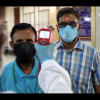Bangladesh needs to mainstream public health services to tackle pandemics: experts

Experts have said public health practices in the country needs to be made more mainstream and widely available to improve overall health situation and tackle pandemics such as Covid-19.
The country's health system is mostly focused on the remedial side which is handled by
clinicians. But if a population's health is to be improved, it should also ensure better public health that includes preventive measures and healthcare management, experts say.
The observations came during a webinar titled "Mainstreaming Public Health in the National Health System of Bangladesh" organised by the Public Health Foundation Bangladesh (PHFB) on Saturday night.
In his keynote address, PHFB Executive Director Dr Taufique Joarder said Bangladesh has been caught off-guard by the Covid-19 pandemic, mainly due to its historical negligence towards a public health system and pertinent public health education.
The pandemic demanded a central as well as a local level public health response by trained professionals but this could not be ensured due to the non-existence of such services. A recent survey revealed, only five percent of the Upazila Health and Family Planning Officers (UH&FPOs) hold a degree in public health said Dr Taufique Joarder.
On top of it, at the central level, the DGHS is principally managed by clinicians at the expense of public health experts. At the MoHFW level, the top health-bureaucrats are mostly drawn from other ministries, often unrelated to the health sector, he said.
In Bangladesh, only doctors with MBBS degree (or equivalent) are recruited as officers in BCS (health) cadre. In contrast, any new recruit in the Sri Lankan health service has to choose either of the two tracks: curative or preventive healthcare institutions.
"Our proposition for the reform of the health service structure of Bangladesh, similar to Sri
Lanka, is to formalise public health within the mainstream health service architecture," Dr Joarder said.
Prof Shah Monir Hossain, former DG of DGHS, said the health ministry in Bangladesh is largely run by the administration officials with no education or experience in health or public health. On the other hand, a civil surgeon is basically a clinician with no experience or education on public health.
Even, those running hospitals don't have health management skills which they must have, he said.
"We need a massive reform, but we don't see political commitment," Monir Hossain said.
Dr Halida Hanum Akhter, senior associate at the Center for Human Nutrition, Department of International Health, Johns Hopkins Bloomberg School of Public Health, said development of a country largely depends on how good a country's public health system is.
Sadly, the concept of public health is almost absent in Bangladesh. Also, commitment of the healthcare professionals to the community needs to be instilled into students at undergraduate levels which can lead to vital reforms.
Health communication and advocacy for behavior change is also important in public health but that's neglected in the country's medical education, Dr Halida said.
Speakers proposed a broad consultation on the restructuring of the country's health system, including legal reforms.
Farida Akter of UBINIG, former additional DG of DGHS Prof Sanya Tahmina, WHO former adviser Prof Muzaherul Huq, Bangladesh University of Health Sciences former VC Prof Liaqat Ali and Prothom Alo Joint Editor Mizanur Rahman Khan also spoke at the webinar chaired by PHFB Chairperson Prof Sharmeen Yasmeen.

 For all latest news, follow The Daily Star's Google News channel.
For all latest news, follow The Daily Star's Google News channel. 








Comments